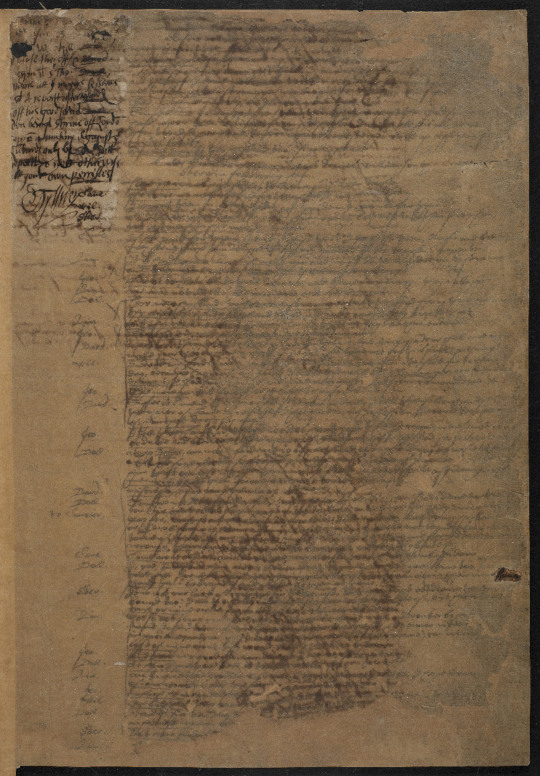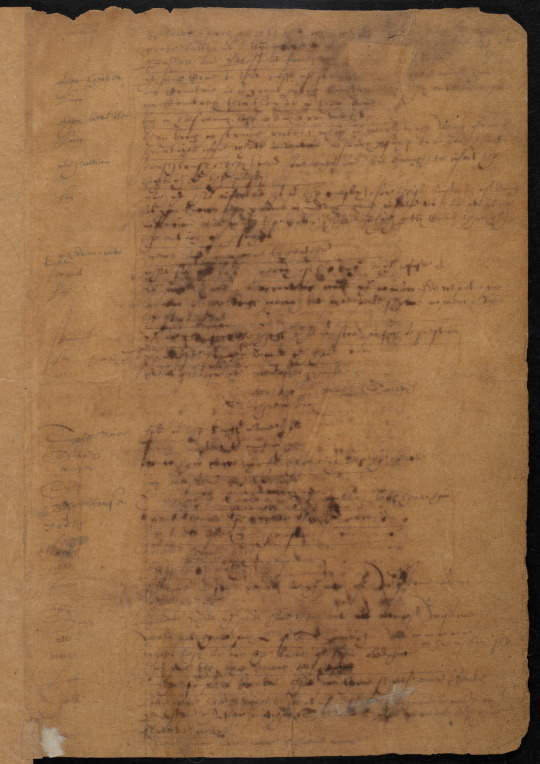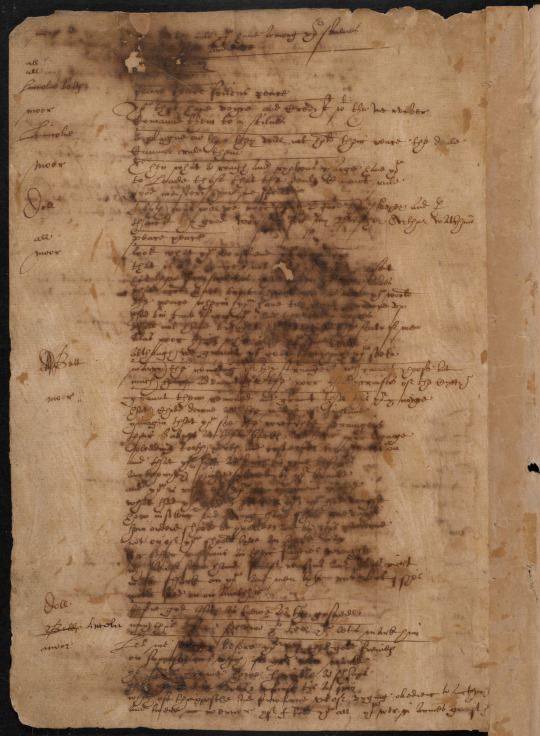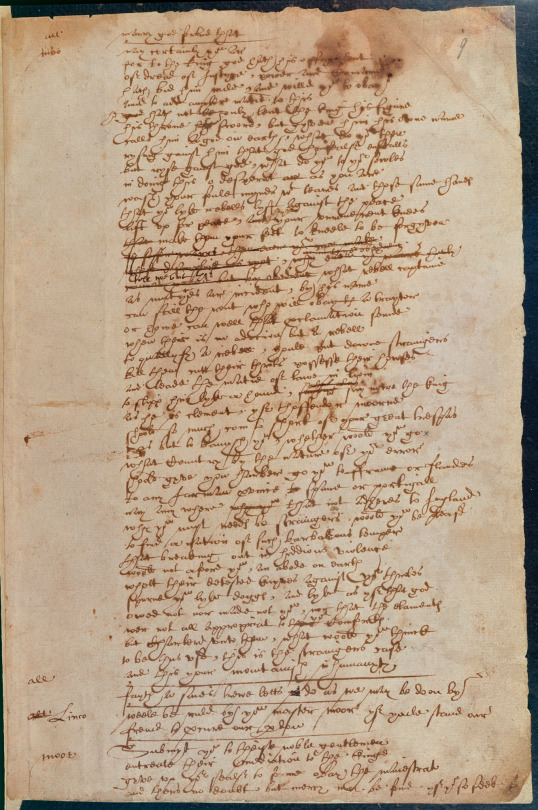#lyam-hound
Note
2&20 for the shakespeare asks!!
2. Do you believe in ghosts?
yeah! in a lot of different ways. i like the saying that ghosts are regret, longing for what is no longer or the lingering presence of something impactful that happened before etc. i also think ghosts, as in souls that have passed but were too fearful or angry etc to go with death, exist too. i think they mostly are working through their own stuff. ive had some spooky encounters but nothing bad. i say just incase that when i feel it that i respectfully encourage them to move on. if its a horror for someone out there i cant speak to that.
20. Favourite Shakespeare quote? Favourite play?
King Lear is probably my fav play! Favorite quote is “You must need be strangers” it comes from this:
“You’ll put down strangers,/ Kill them, cut their throats, possess their houses,/ And lead the majesty of law in lyam/ To slip him like a hound. Alas, alas! Say now the King/ As he is clement if th’offender mourn,/ Should so much come too short of your great trespass/ As but to banish you: whither would you go?/What country, by the nature of your error,/ Should give you harbour? Go you to France or Flanders,/ To any German province, Spain or Portugal,/ Nay, anywhere that not adheres to England:/ Why, you must needs be strangers.”
edit: sorry i had to go searching for this @wordforworldisforest
#mw asks#shakespeare ask game#wordforworldisforest#have i told you that you are an international treasure#your writing is beautiful 🫶🏾
6 notes
·
View notes
Photo




The Booke of Sir Thomas Moore, 1601–04, Manuscript, Playscript, Creator: Anthony Munday, Edmund Tillney, Henry Chettle, Thomas *Heywood, William Shakespeare, Thomas*Dekker, unknown copyist. Held by British Library Shelfmark: Harley MS 7368
“This is part of the only surviving play script to contain Shakespeare's handwriting. Three pages of the manuscript, ff. 8r, 8v and 9r, have been identified as Shakespeare’s, based on handwriting, spelling, vocabulary and the images and ideas expressed. The play is about the life of Sir Thomas More, the Tudor lawyer and polymath who was sentenced to death for refusing to recognise Henry VIII as Supreme Head of the Church in England. The work was initially written by Anthony Munday between 1596 and 1601. The Master of the Revels, Edmund Tilney, whose role included stage censorship, refused to allow Sir Thomas More to be performed, perhaps because he was worried that the play’s depiction of riots would provoke civil unrest on the streets of London. After the Queen’s death in 1603, Shakespeare was brought in to revise the script, along with three other playwrights. Shakespeare’s additions include 147 lines in the middle of the action, in which More is called on to address an anti-immigration riot on the streets of London. He delivers a gripping speech to the aggressive mob, who are baying for so-called ‘strangers’ to be banished:
You’ll put down strangers,
Kill them, cut their throats, possess their houses,
And lead the majesty of law in lyam
To slip him like a hound; alas, alas, say now the King,
As he is clement if th’offender mourn,
Should so much come too short of your great trespass
As but to banish you: whither would you go?
What country, by the nature of your error,
Should give you harbour? Go you to France or Flanders,
To any German province, Spain or Portugal,
Nay, anywhere that not adheres to England,
Why, you must needs be strangers, would you be pleas’d
To find a nation of such barbarous temper
That breaking out in hideous violence
Would not afford you an abode on earth.
Whet their detested knives against your throats,
Spurn you like dogs, and like as if that God
Owed not nor made not you, not that the elements
Were not all appropriate to your comforts,
But charter’d unto them? What would you think
To be us’d thus? This is the strangers’ case
And this your mountainish inhumanity.
More relies on human empathy to make his point: if the rioters were suddenly banished to a foreign land, they would become ‘wretched strangers’ too, and equally vulnerable to attack. In the words of critic Jonathan Bate: ‘More asks the on-stage crowd, and by extension the theatre audience, to imagine what it would be like to be an asylum-seeker undergoing forced repatriation.’ Though proving that More’s words were indeed written by Shakespeare is not straightforward, in their keen sympathy for the plight of the alienated and dispossessed they seem to prefigure the insights of great dramas of race such as The Merchant of Venice and Othello. Whoever wrote them had a fine ear for the way rhetoric can sway a crowd – it’s hard not to think of Julius Caesar, too – but also a sharp eye for the troubled relationship between ethnic minorities and majorities. Tilney’s instructions to the authors can be seen in the margin of f. 3r (the first page shown here):
Leave out the insurrection wholly and the cause thereof, and begin with Sir Thomas More at the Mayor’s sessions, with a report afterwards of his good service done being Sheriff of London upon a mutiny against the Lombards – only by a short report, and not otherwise, at your own perils. E. Tilney.
As well as Shakespeare, there are additions in the hands of Henry Chettle, Thomas Dekker, Thomas Heywood and an anonymous copyist. There is no evidence that the play was ever performed or published.”
0 notes
Photo


You’ll put down strangers,/ Kill them, cut their throats, possess their houses,/ And lead the majesty of law in lyam/ To slip him like a hound. Alas, alas! Say now the King/ As he is clement if th’offender mourn,/ Should so much come too short of your great trespass/ As but to banish you: whither would you go?/What country, by the nature of your error,/ Should give you harbour? Go you to France or Flanders,/ To any German province, Spain or Portugal,/ Nay, anywhere that not adheres to England:/ Why, you must needs be strangers.
Even if most of us couldn’t be part of this powerful, intense experience we can still honor these performances by contributing with a donation to the UN Refugee Agency.
Iain put ‘a lot of heart’ in his Hamlet - do the same and DONATE.
#iain de caestecker#agents of shield#leo fitz#fitzsimmons#PSA#the undiscovered country from whose bourn no traveller returns#whither would you go
100 notes
·
View notes
Text
anti immigration riot put down right by Shakespeare/ Sir Thomas More
from Elizabethan play, Sir Thomas More:
You’ll put down strangers,
Kill them, cut their throats, possess their houses,
And lead the majesty of law in lyam
To slip him like a hound; alas, alas, say now the King,
As he is clement if th’offender mourn,
Should so much come too short of your great trespass
As but to banish you: whither would you go?
What country, by the nature of your error,
Should give you harbour? Go you to France or Flanders,
To any German province, Spain or Portugal,
Nay, anywhere that not adheres to England,
Why, you must needs be strangers, would you be pleas’d
To find a nation of such barbarous temper
That breaking out in hideous violence
Would not afford you an abode on earth.
Whet their detested knives against your throats,
Spurn you like dogs, and like as if that God
Owed not nor made not you, not that the elements
Were not all appropriate to your comforts,
But charter’d unto them? What would you think
To be us’d thus? This is the strangers’ case
And this your mountainish inhumanity.
http://www.bl.uk/collection-items/shakespeares-handwriting-in-the-book-of-sir-thomas-more
1 note
·
View note
Link
From the speech:
You’ll put down strangers, Kill them, cut their throats, possess their houses, And lead the majesty of law in lyam To slip him like a hound; alas, alas, say now the King, As he is clement if th’offender mourn, Should so much come too short of your great trespass As but to banish you: whither would you go?
3 notes
·
View notes
Text
You’ll put down strangers,
Kill them, cut their throats, possess their houses,
And lead the majesty of law in lyam
To slip him like a hound; alas, alas, say now the King,
As he is clement if th’offender mourn,
Should so much come too short of your great trespass
As but to banish you: whither would you go?
What country, by the nature of your error,
Should give you harbour? Go you to France or Flanders,
To any German province, Spain or Portugal,
Nay, anywhere that not adheres to England,
Why, you must needs be strangers, would you be pleas’d
To find a nation of such barbarous temper
That breaking out in hideous violence
Would not afford you an abode on earth.
Whet their detested knives against your throats,
Spurn you like dogs, and like as if that God
Owed not nor made not you, not that the elements
Were not all appropriate to your comforts,
But charter’d unto them? What would you think
To be us’d thus? This is the strangers’ case
And this your mountainish inhumanity.
Sir Thomas More, Shakespeare(ish)
0 notes
Video
youtube
The 400-year Old Shakespearean Speech Used For Refugee Rights
Speech text, from The Book of Sir Thomas More, Act 2, Scene 4
(speech starts at 2 min 20 sec.)
Grant them removed, and grant that this your noise
Hath chid down all the majesty of England;
Imagine that you see the wretched strangers,
Their babies at their backs and their poor luggage,
Plodding to the ports and coasts for transportation,
And that you sit as kings in your desires,
Authority quite silent by your brawl,
And you in ruff of your opinions clothed;
What had you got? I’ll tell you: you had taught
How insolence and strong hand should prevail,
How order should be quelled; and by this pattern
Not one of you should live an aged man,
For other ruffians, as their fancies wrought,
With self same hand, self reasons, and self right,
Would shark on you, and men like ravenous fishes
Would feed on one another.
O, desperate as you are,
Wash your foul minds with tears, and those same hands,
That you like rebels lift against the peace,
Lift up for peace, and your unreverent knees,
Make them your feet to kneel to be forgiven!
You’ll put down strangers,
Kill them, cut their throats, possess their houses,
And lead the majesty of law in lyam
To slip him like a hound;
Say now the king
Should so much come too short of your great trespass
As but to banish you, whither would you go?
What country, by the nature of your error,
Should give you harbour? go you to France or Flanders,
To any German province, to Spain or Portugal,
Nay, any where that not adheres to England,
Why, you must needs be strangers: would you be pleased
To find a nation of such barbarous temper,
That, breaking out in hideous violence,
Would not afford you an abode on earth,
Whet their detested knives against your throats,
Spurn you like dogs, and like as if that God
Owed not nor made not you, nor that the claimants
Were not all appropriate to your comforts,
But chartered unto them, what would you think
To be thus used? this is the strangers case;
And this your mountainish inhumanity.
Context:
The identity of William Shakespeare has been a literary mystery for four hundred years, inspiring theory after theory, book after book.
Since around the turn of the 20thcentury, however, scholars have come to agree that three pages of a manuscript in an Elizabethan play called Sir Thomas More contain Shakespeare’s handwriting. The play, writes the British Library—who house the physical pages and have digital scans at their site—tells the story of “the Tudor lawyer and polymath who was sentenced to death for refusing to recognise Henry VIII as Supreme Head of the Church in England.”
Some six hundred years ago in medieval England, feverish xenophobia swept through the population as 64,000 foreigners, from wealthy Lombard bankers to Flemish laborers, arrived on English shores between 1330 and 1550 in search of better lives. Locals blamed them for taking their jobs and distorting their culture. Tensions reached a zenith on May 1, 1517, as riots broke out in London and a mob armed with stones, bricks, bats, boots and boiling water attacked the immigrants and looted their homes. Thomas More, then the city’s deputy sherif, tried to reason with the crowd.
This dark day in history, known as Evil May Day, was portrayed in the then-banned play, believed to be written between 1596 and 1601. William Shakespeare and two other writers were called to edit the manuscript, with the Bard contributing the 147 lines of More’s emphatic pro-immigrant monologue.
The play was never performed in Shakespeare’s lifetime because the Queen’s censor, Edmund Tilney, thought it might incite riots during a time when England was once again besieged by another immigrant crisis with the arrival of French-speaking Protestant asylum seekers from France, Belgium and the Netherlands.
More’s call for empathy, famously delivered by actor Ian Mckellan who played More on stage in 1964, has since become a clarion call for refugee advocates today.
___
Source: Open Culture, Quartz, PlayShakespeare (January 2017)
0 notes